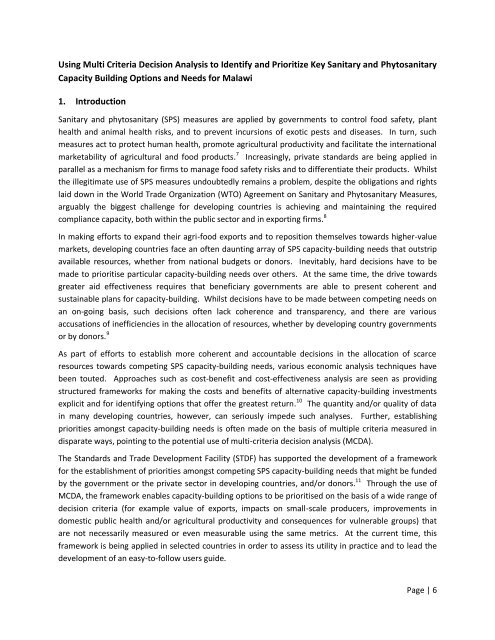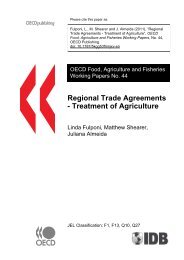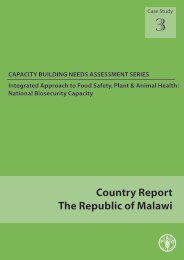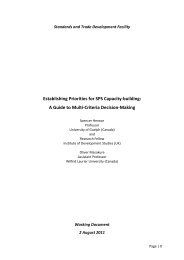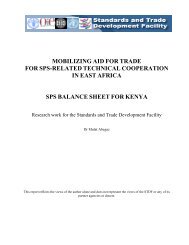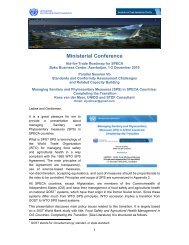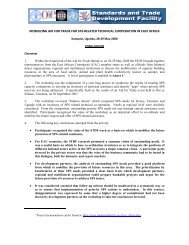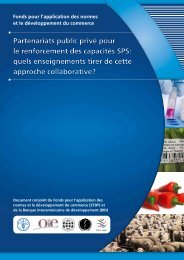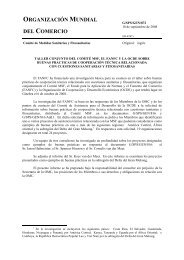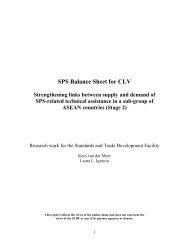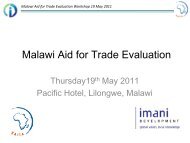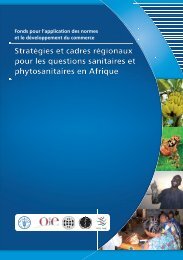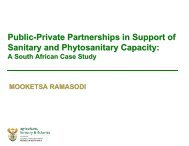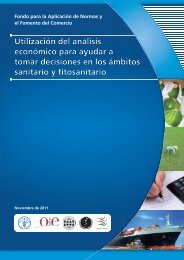MCDA Final Report Malawi - Standards and Trade Development ...
MCDA Final Report Malawi - Standards and Trade Development ...
MCDA Final Report Malawi - Standards and Trade Development ...
Create successful ePaper yourself
Turn your PDF publications into a flip-book with our unique Google optimized e-Paper software.
Using Multi Criteria Decision Analysis to Identify <strong>and</strong> Prioritize Key Sanitary <strong>and</strong> Phytosanitary<br />
Capacity Building Options <strong>and</strong> Needs for <strong>Malawi</strong><br />
1. Introduction<br />
Sanitary <strong>and</strong> phytosanitary (SPS) measures are applied by governments to control food safety, plant<br />
health <strong>and</strong> animal health risks, <strong>and</strong> to prevent incursions of exotic pests <strong>and</strong> diseases. In turn, such<br />
measures act to protect human health, promote agricultural productivity <strong>and</strong> facilitate the international<br />
marketability of agricultural <strong>and</strong> food products. 7 Increasingly, private st<strong>and</strong>ards are being applied in<br />
parallel as a mechanism for firms to manage food safety risks <strong>and</strong> to differentiate their products. Whilst<br />
the illegitimate use of SPS measures undoubtedly remains a problem, despite the obligations <strong>and</strong> rights<br />
laid down in the World <strong>Trade</strong> Organization (WTO) Agreement on Sanitary <strong>and</strong> Phytosanitary Measures,<br />
arguably the biggest challenge for developing countries is achieving <strong>and</strong> maintaining the required<br />
compliance capacity, both within the public sector <strong>and</strong> in exporting firms. 8<br />
In making efforts to exp<strong>and</strong> their agri-food exports <strong>and</strong> to reposition themselves towards higher-value<br />
markets, developing countries face an often daunting array of SPS capacity-building needs that outstrip<br />
available resources, whether from national budgets or donors. Inevitably, hard decisions have to be<br />
made to prioritise particular capacity-building needs over others. At the same time, the drive towards<br />
greater aid effectiveness requires that beneficiary governments are able to present coherent <strong>and</strong><br />
sustainable plans for capacity-building. Whilst decisions have to be made between competing needs on<br />
an on-going basis, such decisions often lack coherence <strong>and</strong> transparency, <strong>and</strong> there are various<br />
accusations of inefficiencies in the allocation of resources, whether by developing country governments<br />
or by donors. 9<br />
As part of efforts to establish more coherent <strong>and</strong> accountable decisions in the allocation of scarce<br />
resources towards competing SPS capacity-building needs, various economic analysis techniques have<br />
been touted. Approaches such as cost-benefit <strong>and</strong> cost-effectiveness analysis are seen as providing<br />
structured frameworks for making the costs <strong>and</strong> benefits of alternative capacity-building investments<br />
explicit <strong>and</strong> for identifying options that offer the greatest return. 10 The quantity <strong>and</strong>/or quality of data<br />
in many developing countries, however, can seriously impede such analyses. Further, establishing<br />
priorities amongst capacity-building needs is often made on the basis of multiple criteria measured in<br />
disparate ways, pointing to the potential use of multi-criteria decision analysis (<strong>MCDA</strong>).<br />
The <strong>St<strong>and</strong>ards</strong> <strong>and</strong> <strong>Trade</strong> <strong>Development</strong> Facility (STDF) has supported the development of a framework<br />
for the establishment of priorities amongst competing SPS capacity-building needs that might be funded<br />
by the government or the private sector in developing countries, <strong>and</strong>/or donors. 11 Through the use of<br />
<strong>MCDA</strong>, the framework enables capacity-building options to be prioritised on the basis of a wide range of<br />
decision criteria (for example value of exports, impacts on small-scale producers, improvements in<br />
domestic public health <strong>and</strong>/or agricultural productivity <strong>and</strong> consequences for vulnerable groups) that<br />
are not necessarily measured or even measurable using the same metrics. At the current time, this<br />
framework is being applied in selected countries in order to assess its utility in practice <strong>and</strong> to lead the<br />
development of an easy-to-follow users guide.<br />
Page | 6


